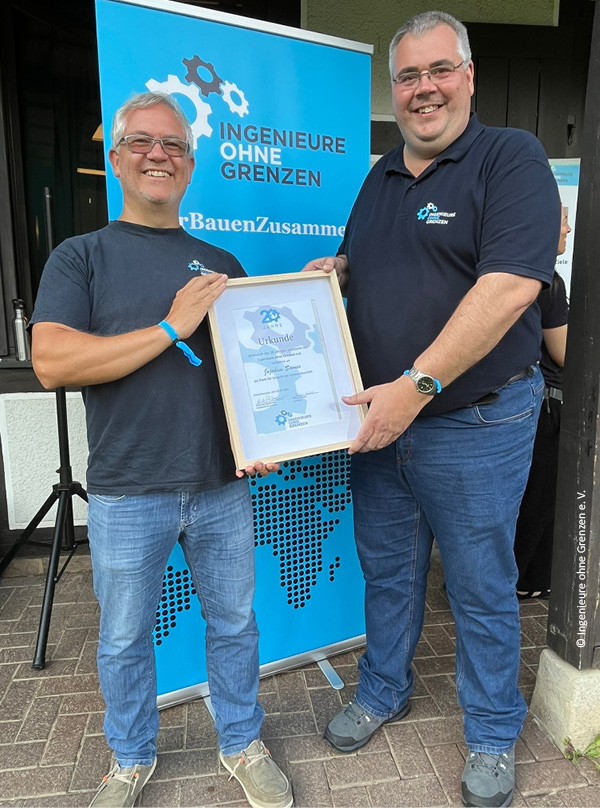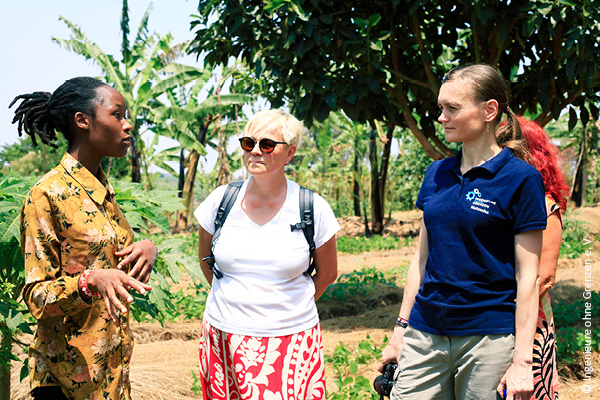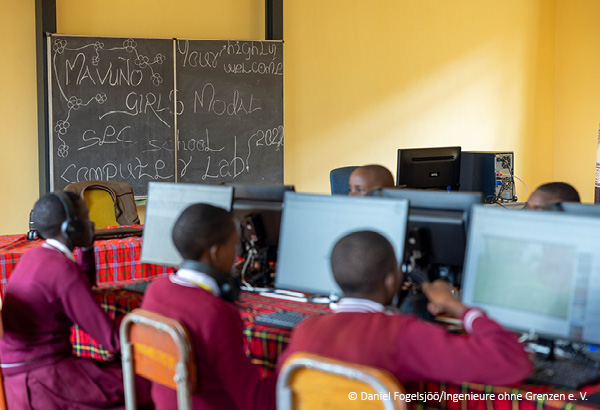
|
Development Cooperation on an Equal FootingAn Interview with Natascha Dubovikova and Robert de Payrebrune Changes to the geopolitical climate are not making development cooperation any easier. This makes the work carried out by non-governmental organizations (NGOs) like Engineers Without Borders Germany (Ingenieure ohne Grenzen; IOG), which PROSTEP has long supported, all the more important. In this interview, IOG's chairman of the board, Robert de Payrebrune, and deputy chairwoman, Natascha Dubovikova, discuss the challenges posed by the work being carried out in the projects. Question: What are the main objectives of IOG? de Payrebrune: We provide technical development cooperation. Our aim is to create a basic infrastructure for people in the Global South. Our work focuses on water supply, sanitation, electrification and construction projects that range from basic infirmaries to schools for more than 1,000 pupils. We've built a large school in Zimbabwe, and we're involved in large school projects in Tanzania, in Nepal and in Kenya. Question: IOG has been around for more than 20 years. How big is the organization today? de Payrebrune: We have just under 5,000 supporting members, of whom between 900 and 1,000 are actively involved in the regional and competence groups and in local projects. The regional groups act as our representatives on the ground. They maintain contact with interested parties and donors. 
Question: But not all of them are engineers, right? Dubovikova: That's right. Many people, with different backgrounds, work for us because we don't just offer technical solutions. Development cooperation requires intercultural communication, which ensures that we treat local people as equals and are able to create an understanding of ownership. Ownership means that the local people understand that this is their project because they helped plan and organize it. They ensure that the project will be continued. Question: How has project focus changed over time? de Payrebrune: WASH, in other words water, sanitation and hygiene, remains a key focus. We established this focus in 2003. What has changed is the fact that the projects have become more complex because the local people no longer need our support for many of the things that were part of development cooperation 15 years ago. Our projects are becoming more technically ambitious and more comprehensive. Take a school for example: It's no longer just about creating a water supply but also about sanitation, providing electricity using a PV system, or even building playgrounds. Dubovikova: Our quality standards have also risen. In the past, we often looked for small-scale local project partners. Now we are working with strategic partner organizations, which serve as our hands, eyes and ears. They provide us with reliable information about the situation on the ground, carry out planning together with us and provide us with support with formalities. Question: What kind of organizations are these strategic partners? Dubovikova: Suubi Community Projects (SUUBI), an NGO in Uganda, for example. Its main focus is well construction, but it also provides us with support for other projects. We currently have a large number of sanitation projects in Uganda, where we are building dry separation toilets. Question: Are there also joint projects with sister companies of Engineers without Borders? Dubovikova: Yes, we're carrying out a joint project in Tanzania together with Engineers without Borders Sweden for example, and we're also constantly exchanging fundraising information because the Swedes take a slightly different approach. We're all part of the Engineers without Borders Europe family, but each of us have somewhat different key focal points. Waste management, for example, is a major topic for Engineers without Borders Luxembourg but it's not yet a key focus for us. We can learn from each other. 
Question: How important is sustainability in the context of your projects? Dubovikova: It's a top priority. What's important is ensuring that everything that we've created together with partners is sustainable and will still be helping people in ten or fifteen years' time. Question: How do you ensure this sustainability? Do you have something along the lines of project reviews? de Payrebrune: One key component is, of course, our long-term collaboration with strategic partners, which ensures that we're able to keep an eye or ear on the projects for three, four or five years after they have been brought to a close. Another component is what Natascha mentioned earlier, namely ownership. When local people consider a project to be their own, they themselves ensure that it keeps going and functions properly over the long term. Our projects always include a training component, which ensures that the people are able to operate and maintain the systems and, in a best case scenario, even recreate them. Dubovikova: The "Teach the Teacher" concept is one of the tools that we use to ensure ongoing development and maintenance of projects. We work together with the local partner organizations in order to, for example, develop structures like water committees at the schools, which take care of minor maintenance tasks themselves. Question: Do you also receive project proposals from the countries in which you are active? de Payrebrune: Most projects today come about as the result of requests from project host countries. We often develop new ideas for projects together with our strategic partners, who communicate their needs to us, and we then decide together how we can support them. The successful completion of a project at one school sometimes calls the attention of a neighboring school to it. Question: How do you finance your projects and the work performed in the association? de Payrebrune: Primarily from donations from private individuals and companies. And sometimes we receive grants from foundations for specific projects. Donations have, however, been falling in recent years, while at the same time our project costs have been rising due to inflation. People are taking a closer look at how much they have their wallets. At the moment, we have a budget of approximately 1.4 million euros per year. Question: How do you prepare your volunteers for their assignments abroad? de Payrebrune: We have an internal training concept with a number of different workshops that help prepare people for what to expect in the project countries. They deal with topics like security, child protection, the protection of minorities, etc. There are also workshops on project management, technical workshops and workshops on intercultural communication. Some are mandatory, others are voluntary, but they are always well attended because they're extremely interesting. Question: But no doubt there is one or the other surprise in store for your volunteers? Dubovikova: Even if it's also an adventure, we have to make sure that no one comes to harm. That is why we conduct pre-departure workshops with the aim of making people aware of safety issues and making sure that they aren't just going there just to have an adventure but also to actually work on the projects. de Payrebrune: The safety of our people is our top priority. We are in constant contact with the pre-departure teams, in so far as the technology allows. There is an emergency contact number that is manned around the clock. We don't send anyone to crisis or war zones or to areas where their health could be endangered by epidemics. Projects will sometimes be postponed if a country is not safe. Question: What are the greatest challenges that your projects face? Dubovikova: The lack of time. Our 900 to 1,000 volunteers have full-time jobs or are studying at university, they have families, friends, etc. and are not available eight hours a day. But if we want to ensure a high standard of quality, we have to invest time. This means that projects sometimes take longer than we would like. That is the biggest hurdle in our project work. We could do with a few more volunteers, and not just engineers. Question: How long do the volunteers stay abroad? de Payrebrune: The time they spend abroad depends, of course, on the project. While the school was being built in Kenya, people from our company were on site for over six months, but in multiple shifts. 
Dubovikova: We often only have people on site at the beginning and at end of a project. In the interim, the partner organization assumes responsibility for managing construction. Question: What impact is the change in the geopolitical climate having on your work? Is it becoming more difficult? de Payrebrune: We're not yet feeling the impact of the withdrawal of USAID funding, but it will have an impact on us because one component of our global development collaboration will be missing. More people will suffer hardship. This makes the work performed by smaller organizations like ours, which are not affected to such a great extent by political developments, all the more important. But we are, however, also seeing a change in the political climate in Germany and Europe. The shift to the right means that people are focusing to a greater extent on their own country. It makes it more difficult to explain why we provide support to people. Luckily, this is not yet having a negative impact on our financing, but the climate is changing and we find that worrying. Question: Engineers are becoming short in supply in Germany. What is IOG doing to ensure a new generation of engineers? de Payrebrune: That's a problem that we are tackling with our activities in Germany. We go into schools and organize STEM Days and project weeks with students at the schools. We talk about technical topics related to our development cooperation, have fun and arouse interest. And there's our IOG Challenge, where university students spend a semester working on a project with us. Question: What was the most recent IOG Challenge? de Payrebrune: Our most recent challenge involved developing a dry separation toilet for the private sector. We've been building these toilets at schools for years, i.e. large toilet facilities with a large number of cubicles. The biggest challenge was the cost limit. The students had to work with a partner organization to find out what materials they could source locally, what they would cost and then develop the toilet. Dubovikova: The interesting thing was the fact that the request came from a partner organization that was conducting a school project in Sierra Leone. The children's parents and neighbors have seen that using the liquid and solid waste as fertilizers makes a difference and have asked whether they could have something like that at home. Ms. Dubovikova, Mr. de Payrebrune, thank you very much for talking to us. About the people being interviewed Natascha Dubovikova (born 1983) is deputy chairwoman of Engineers Without Borders Germany and the representative for projects abroad. She herself has provided support for a large school construction project in Kenya and is currently involved with the building of a school in Tanzania and creating an energy supply for an educational center in Indonesia. She also provides the project groups with advice regarding sustainability and quality as part of the "Basic Services for Schools" program. Natascha Dubovikova completed her master's degree in mechanical engineering at the Technical University of Ukraine in Kiev and completed her doctorate at the Technical University of Ilmenau, where she worked for several years as a postdoctoral researcher. She moved into the private sector in 2021. She is currently working in product management in the optics division of Jenoptik. Natascha Dubovikova is married and the mother of two grown children. Robert de Payrebrune, 54, has been chairman of the board of Engineers Without Borders Germany since 2022 and is primarily responsible for the development of the organization and volunteer management. He has been active in the organization since 2011, heading up the regional groups in Freiberg and Kaiserslautern prior to joining the executive board in 2018. After completing his degree in mechanical engineering at Leibniz University Hanover, de Payrebrune worked in adult and higher education as well as in science management projects at, for example, VW Coaching GmbH, TU Bergakademie Freiberg and RPTU in Kaiserslautern. He is currently employed in the administration department of the Evangelical Church of the Palatinate. |
|
| © PROSTEP AG | ALL RIGHTS RESERVED | IMPRINT | PRIVACY STATEMENT | YOU CAN UNSUBSCRIBE TO THE NEWSLETTER HERE. |
